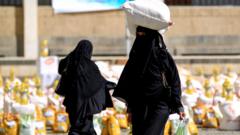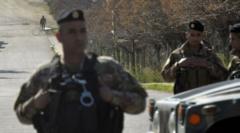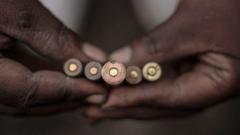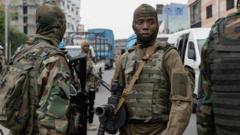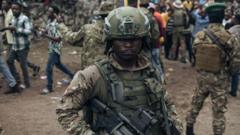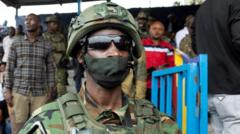The fall of Bukavu to M23 rebels backed by Rwanda marks a critical point in the ongoing conflict in the eastern Democratic Republic of Congo (DRC), prompting widespread concern over potential regional repercussions and humanitarian crises for the local population.
M23 Rebels Seize Control of Bukavu Amid Growing Tensions in Eastern DR Congo
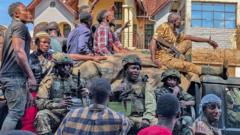
M23 Rebels Seize Control of Bukavu Amid Growing Tensions in Eastern DR Congo
As Rwandan-backed M23 rebels take over Bukavu, fears of a regional war escalate, raising questions about international involvement and humanitarian impacts.
The eastern Democratic Republic of Congo (DRC) has witnessed a significant escalation of conflict as Rwandan-backed M23 rebels successfully seized the city of Bukavu, the region's second-largest urban area. The takeover occurred without resistance on Sunday, allowing the insurgents to capture the regional governor’s office, only weeks after they had previously conquered the city of Goma. As crowds reportedly cheered the advancing M23 fighters, government officials recognized the volatile situation, advising residents to remain indoors to avoid confrontations with the occupying forces.
The aftermath of the takeover has been chaotic, with unverified reports of gunfire resonating throughout the city, as well as accounts of looting and a prison break following the military withdrawal of Congolese troops. A local resident, who requested anonymity due to safety fears, indicated that armed youth had taken control, reflecting an alarming breakdown of order. The conflict has displaced hundreds of thousands, aggravating a humanitarian crisis that the UN warns could potentially spiral into a wider regional war.
Formed in 2021, the M23 group has expanded its territorial hold remarkably since its re-emergence, with Bukavu's fall marking a significant gain for the insurgents. According to Congolese government spokesman Patrick Muyaya, Rwanda's interference undermines DRC's sovereignty, highlighting concerns over alleged resource exploitation and human rights violations associated with Rwanda’s alleged military support for the rebels. Kigali, on the other hand, categorically denies such accusations, maintaining that their involvement is primarily for national security and stemming from perceived threats posed by the DRC-based FLDR rebel group.
Responses from international and African bodies underscore the urgent requirement for diplomatic intervention. The African Union (AU) has reiterated calls for disarmament and highlighted the potential for increased violence across the region, reflecting widespread unease over the prospect of an open war.
While diplomatic efforts are being considered, the leaders of both nations, President Félix Tshisekedi of the DRC and President Paul Kagame of Rwanda, have yet to reach a consensus as they navigate complex historical grievances, ethnic tensions, and competing national interests. As the situation unfolds, the humanitarian and geopolitical implications of the conflict in Bukavu will remain at the forefront of international discourse.

